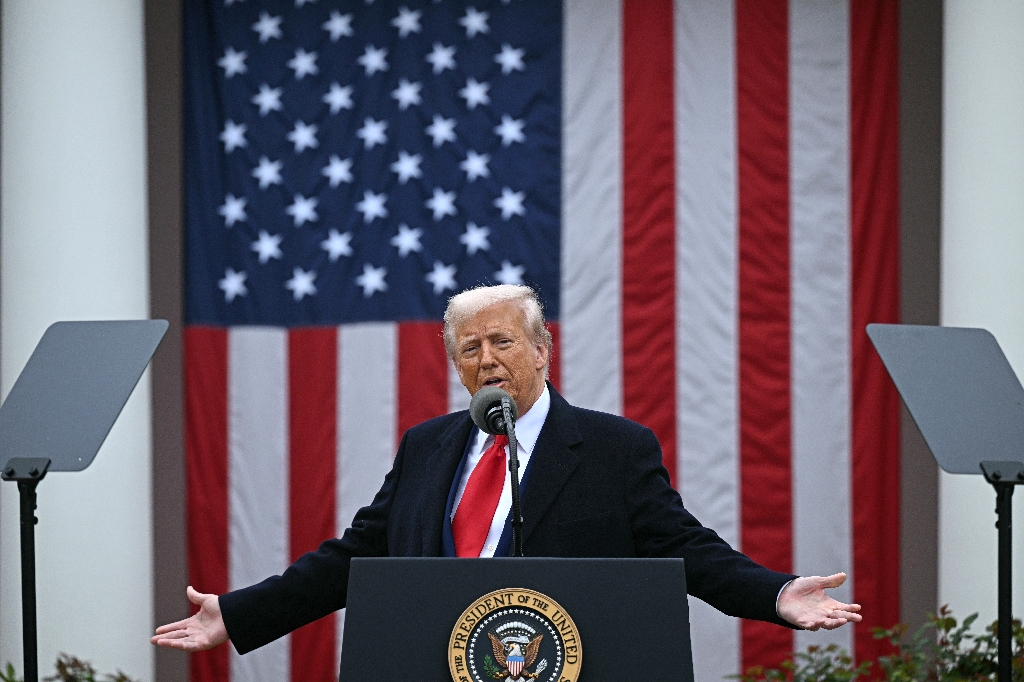Moscow (AFP) – Evan Gershkovich, a Wall Street Journal reporter who has spent a year behind bars in Russia, is awaiting a trial on espionage charges the White House says are fabricated but could still see him jailed for decades.
The US-born son of Soviet emigres covered Russia for six years, including a stint with AFP, as the Kremlin made independent, on-the-ground reporting increasingly dangerous and illegal.
His arrest in March 2023 on charges of spying — the first such charge against a Western journalist since the Soviet era — showed that the Kremlin was prepared to go further than ever before in what President Vladimir Putin has called a “hybrid war” with the West.
The Wall Street Journal and the White House vehemently deny Russia’s accusation, which they see as a false pretext to secure the release of Russians in custody in the US.
President Vladimir Putin said last month he would like to see Gershkovich released as part of a prisoner exchange, but cautioned certain “terms” were being discussed.
The 32-year-old, who has been remanded in custody until at least the end of June, faces up to 20 years in prison if found guilty.
– ‘You love this country’ –
Gershkovich had carried on reporting from across Russia, even after dozens of other foreign correspondents left over Moscow’s military offensive in Ukraine.
His mother, Ella Milman, told AFP this year she was initially happy he had made a life for himself in a country that she and his father had fled.
“It was amazing,” she said.
“I told him I left this country and you love this country — and what a change.”
The Gershkowich family said in a letter published by the Wall Street Journal on Friday that they would pursue their campaign for his release.
“We never anticipated this situation happening to our son and brother, let alone a full year with no certainty or clear path forward,” they said.
“But despite this long battle, we are still standing strong.”
Gershkovich reported extensively on how ordinary Russians experienced the Ukraine conflict, speaking to the families of dead soldiers and Putin critics.
Breaking stories and getting people to talk was becoming increasingly hard, Gershkovich told friends before his arrest.
But as long as it was not impossible, he saw a reason to be there.
“He knew for some stories he was followed around and people he talked to would be pressured not to talk to him,” Guardian correspondent Pjotr Sauer, a close friend, told AFP.
“But he was accredited by the foreign ministry.
I don’t think any of us could see the Russians going as far as charging him with this fake espionage.”
– ‘Not losing hope’ –
Russia has kept information about his case classified, sharing no details since his arrest in the Urals city of Yekaterinburg on March 29, 2023.
In his first contact with the outside world, Gershkovich wrote a handwritten letter to his parents in Russian.
“I am not losing hope,” it read.
For months those notes were the only contact, bar visits from lawyers and US diplomats.
Detained in pre-trial detention, he maintained his sense of humour.
“Mom, you unfortunately, for better or worse, prepared me well for jail food,” he wrote in one letter.
Staying at Moscow’s notoriously isolated Lefortovo prison, the reporter shares a small cell with another inmate.
His sister said she could imagine her brother “making friends” inside the prison.
After one court hearing in January he was seen laughing and smiling with his escort, a balaclava-covered officer shepherding him around in handcuffs.
He gets an hour-long walk in a small prison yard every day, tries to stay fit through exercise and relies on fruit and vegetables sent by friends to supplement the meagre prison diet.
– Family ties –
The son of Jewish parents who emigrated to the United States in the 1970s due to repression and anti-Semitism in the Soviet Union, Gershkovich grew up in New Jersey.
When he arrived in Russia as a fresh-faced journalist at the English-language outlet The Moscow Times, he immediately fell in step with the job.
Gershkovich quickly made a name for himself, breaking big stories on the outlet’s shoestring budget.
At The Moscow Times and later AFP, where he worked for a year, he reported on a Russian opposition politician running for election from prison, unprecedented wildfires in Siberia and how Moscow downplayed the effects of the coronavirus pandemic.
Friends say his character — open, gregarious, and extremely sociable — made Gershkovich’s reporting even better.
He “could make any source comfortable, because they always felt he deeply cared about the story”, Sauer said.
His parents say they are counting on a “very personal” promise from President Joe Biden to bring him home.
“For me it’s devastating to know how much he’s missed, how much time he’s lost,” his sister Danielle told AFP.
“I miss him more and more every day.”
© 2024 AFP




